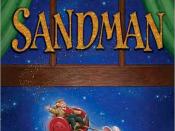Response to The Sandman
Hoffmann's The Sandman tells the story of Nathanael, a romantic poet. Throughout the story, eyes are of particular significance. In Nathanael's letters the motif of the eyes is recurrent and the motif is again highlighted in the latter part of the story, told by the narrator. In this essay, I aim to discuss the motif of the eyes in the story. I will begin with a discussion of the general significance of eyes and I will then go on to the more specific case of Nathanael's childhood nightmare, including how it influenced his adult life, finally I will discuss eyes in relation to the automaton Olimpia, whose creation was partly due to the eyes of Nathanael himself.
Eyes are also constantly referred to in descriptions of people, as well as in the narrator's direct address to the reader. The very fact that Nathanael is a poet, gives the eyes particular significance in his life.
Eyes are often called the window to the soul, eyes show the thoughts and feelings of a person and Nathanael is particularly receptive to this. For Nathanael though, the eyes have an even greater significance, which I will now go on to discuss.
The very title of the story, The Sandman, is a reference to a fairytale that Nathanael was told in his childhood. It is from this description that Nathanael's strange obsession with the eyes developed. As a child Nathanael convinced himself that the Sandman visited his father. Determined to discover the truth, the child Nathanael hid in his father's room, where he learnt that the Sandman was in fact Coppelius, the family lawyer. In Nathanael's letter to Lothar, he describes how Coppelius wanted to rip out his eyes. Nathanael's disturbing childhood experience had a deep impact on his...



Not bad
Not bad not bad. I think you could have used some direct quotes to support your points.
You could also have eloaborated on some of your ideas.
In the introduction, I personally would not have stated what my train of thought through out the essay would be. " I will begin with ... himself." It is a needless repetition of what you are about to say.
You could also very your word usage. For example instead of say "motif" you could use symbolism and theme.
2 out of 2 people found this comment useful.